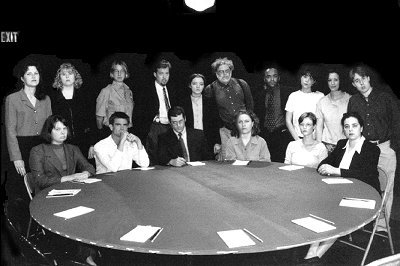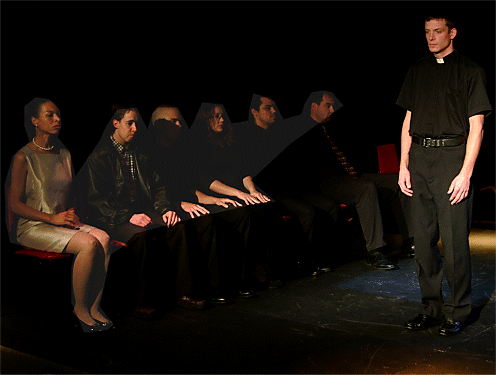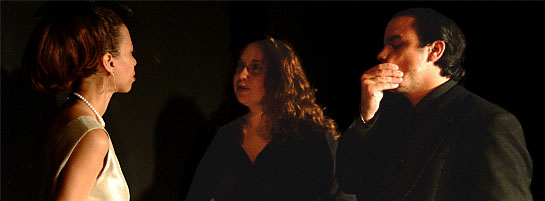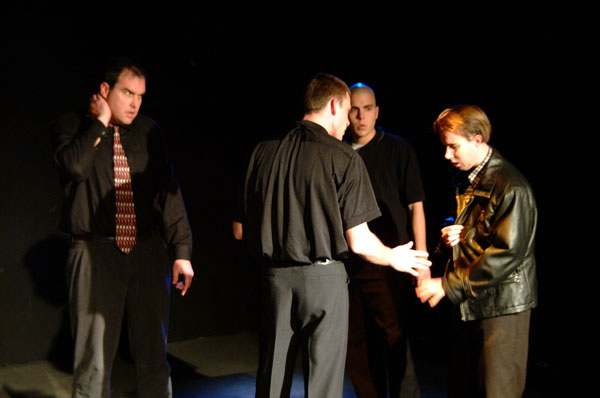Shelley Winters – 2
 Harry Governick With Shelley Winters
Harry Governick With Shelley Winters
“You act with your scars.”
HG: What do you do when your personalities clash [the actor vs. director]?
SW: (long pause) You say to yourself a year from now this thing that’s an issue won’t matter. Maybe even a month from now. You compromise the best you can.
HG: That’s good advice.
SW: Because the director’s the captain of the ship.
HG: Do you think Broadway and Hollywood are doing enough to heighten public awareness of the great social problems facing us today?
SW: Oh, absolutely, it should be used. There are some plays in New York that it is. I just saw two one-act plays, if they’re published you should try to do them, called The End of The Day , by that same writer [John Robin Baitz]. It’s two one-act plays, and after the first one you want to commit suicide, and after the second one, which is theatre of the absurd… it’s how everybody is investing in cocaine, and nobody has any moral standards, and the companies, and the whole thing is money, make money, make money, make money. And that’s true in the movies, too. There’s all this violence they do, and if it’s gonna make money, they make it. And I think there’s no social conscience anymore. When there used to be big studios, they tried to make something to elevate the human condition.
HG: Like A Place In The Sun
SW: Yeah.
HG: If you could do anything differently, or relive your life, would you change anything?
SW: I would have had more children. I would have tried to marry somebody who wasn’t an actor. I would have had a couple of kids, or maybe three, so I would have more grandchildren now. There’s such an obligation to go where the next picture is, or the next play. It has to be almost priority number one in your life. And then suddenly you get to a certain age, and you look back and say, “Wait, wait. When did I have my personal life?” My grandson is fantastic. My daughter’s coming in this weekend with him. I’m hearing every day reports what he does. He’s eight weeks old.
HG: And you feel wonderful, I’ll bet.
SW: (tenderly) Yeah, yeah.
HG: Stanislavski stated that the purpose of the actor is to illuminate the life of the human spirit. Generally speaking, do you feel that actors today are fulfilling that purpose?
SW: To a degree. Some of the television does, I think. The one that Sam Waterston’s doing does. I think there was an attempt with L..A. Law to show right and wrong. Generally speaking, it’s an escape. I think the real life is so stressful, that people just want to sit and turn off their brains. George Bernard Shaw, and I’ll quote him the best I remember, said, “Theatre is its finest as an aloof stater of social consciousness, a recorder of the future, an armory against despair and darkness”. If you could find that, it’s one of his essays.
“It takes 20 years to make an actor.”
HG: Isn’t that one of the reasons that the original people of the Group Theatre founded the Group Theatre?
SW: Yes, exactly. They wanted to reflect the injustices of the society of the time.
HG: And they were appalled by the commercialism of Broadway.
SW: Yeah, those writers. Clifford Odets, Arthur Miller and Lillian Hellman wanted to reflect to people what the injustices were, and try to help change them and make life better.
HG: Do you have a star on Hollywood Boulevard?
SW: Yes. For some strange reason it’s on Vine Street, with Charles Laughton and Melvyn Douglas. I think all the liberal Democrats are on Vine Street. I think the Chamber of Commerce… (laughs) they put us on Vine Street.
HG: You told me a story a long time ago, that I’ve probably embellished and exaggerated. Tell me if my memory is correct. You said you studied with Charles Laughton seven nights a week for three years and never missed a night.
SW: You’re right. Shakespeare.
HG: You told me that in 1975, and I never forgot it.
SW: I did. In the late forties. I think it was ’46, ’47 and ’48.
HG: Seven nights a week?
SW: Even Saturdays and Sundays. If you wanted to have a social life, you had it in the afternoon.
HG: What did Laughton give you?
SW: He gave me an appreciation of the great works of Shakespeare. Shakespeare wrote about everything in the human condition. Everything. The majesty of the language. A reverence for the language. The power of language. Shakespeare didn’t have any sound effects or scenery. He created with onomatopoeia. With the rhythms. He created the sound, the fury and the tempest. The language makes the storm. With Hamlet, he creates the spookiness of incest. You know? He does it all with the language. I have a theory that Shakespeare was a group of actors, not just one. Because “shake-a-spear”, right? And “Will”, for those times, was like “John Doe.” The name ” Will.” That’s just a theory, I can’t prove it. There were so many plays, and so many sonnets, and he died so young. So much poetry. I have a feeling that it was a group of actors, that one of them was a Prince with a University education. Every few years they talk about opening his tomb. But I don’t know. Unless the man was such a genius, which he might have been, like Mozart, how could he have written all that? Unless he was, well I know he was an insomniac. Because, “Sleep, that sometimes shuts up sorrow’s eyes, steal me a while from my own company.”
HG: Uh huh. And people didn’t have television in those days.
SW: Uh huh. And, “McBeth has murdered sleep.” He has a lot about sleep in his plays. So maybe he only slept three hours a night or something.
HG: So maybe he sat up all the time.
SW: Working, yes.
HG: I wish I could do that myself.
SW: Well, we escape it to sleep. Alright, one last question.
HG: If you were me, what question would you ask?
SW: If I were you, I would not give up the theatre. It’s part of your life, you should find a way of making a living, but all your spare time should be devoted to improving yourself, getting an education. Reading plays, and with your lovely wife [Melissa] devote too… because ninety-nine percent is doing work you love. That’s ninety-nine percent of life. The people who can make a living doing what they love are indeed the fortunate of the earth. And you’re good.
HG: Thank you. And you are indeed one of the more fortunate in life.




